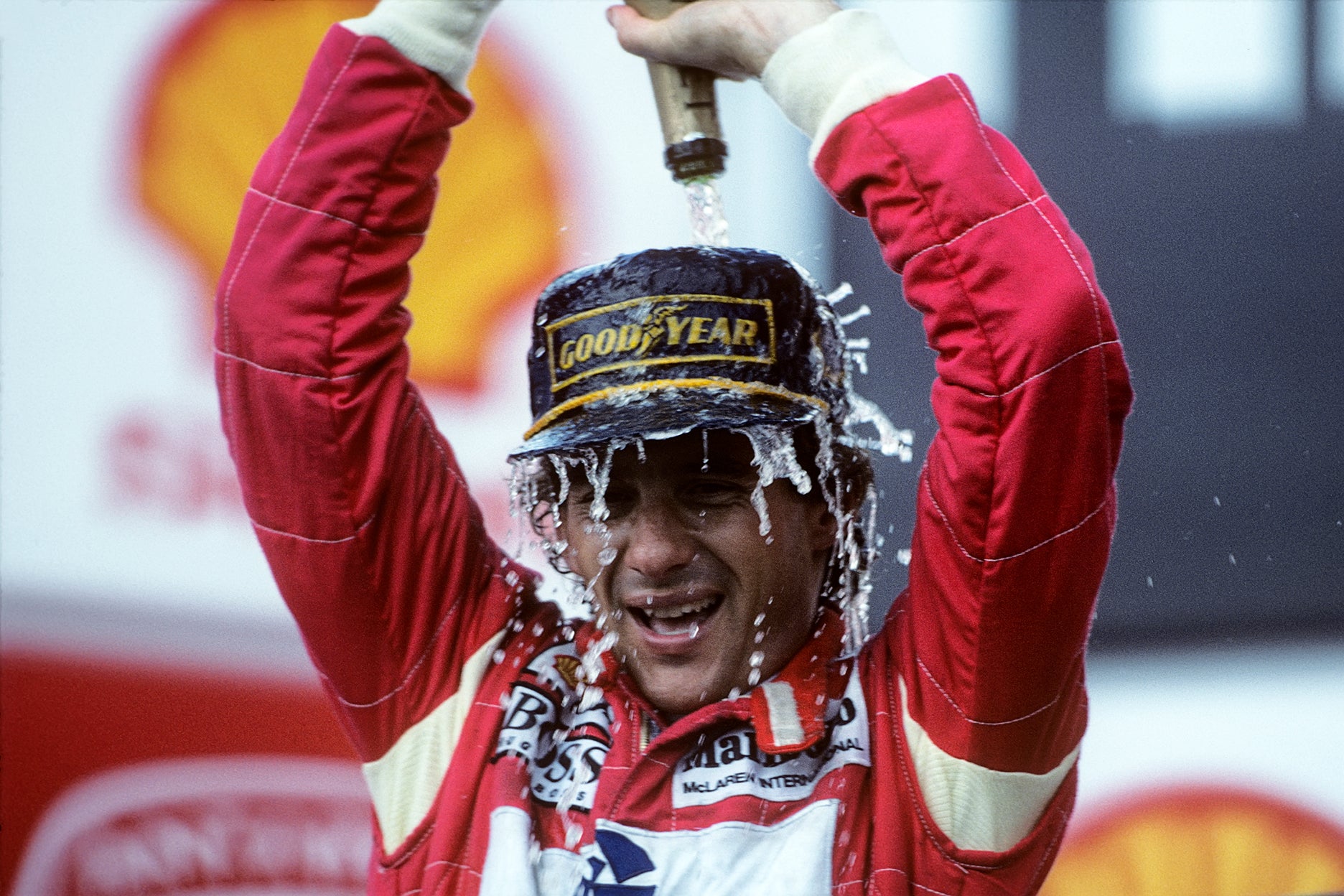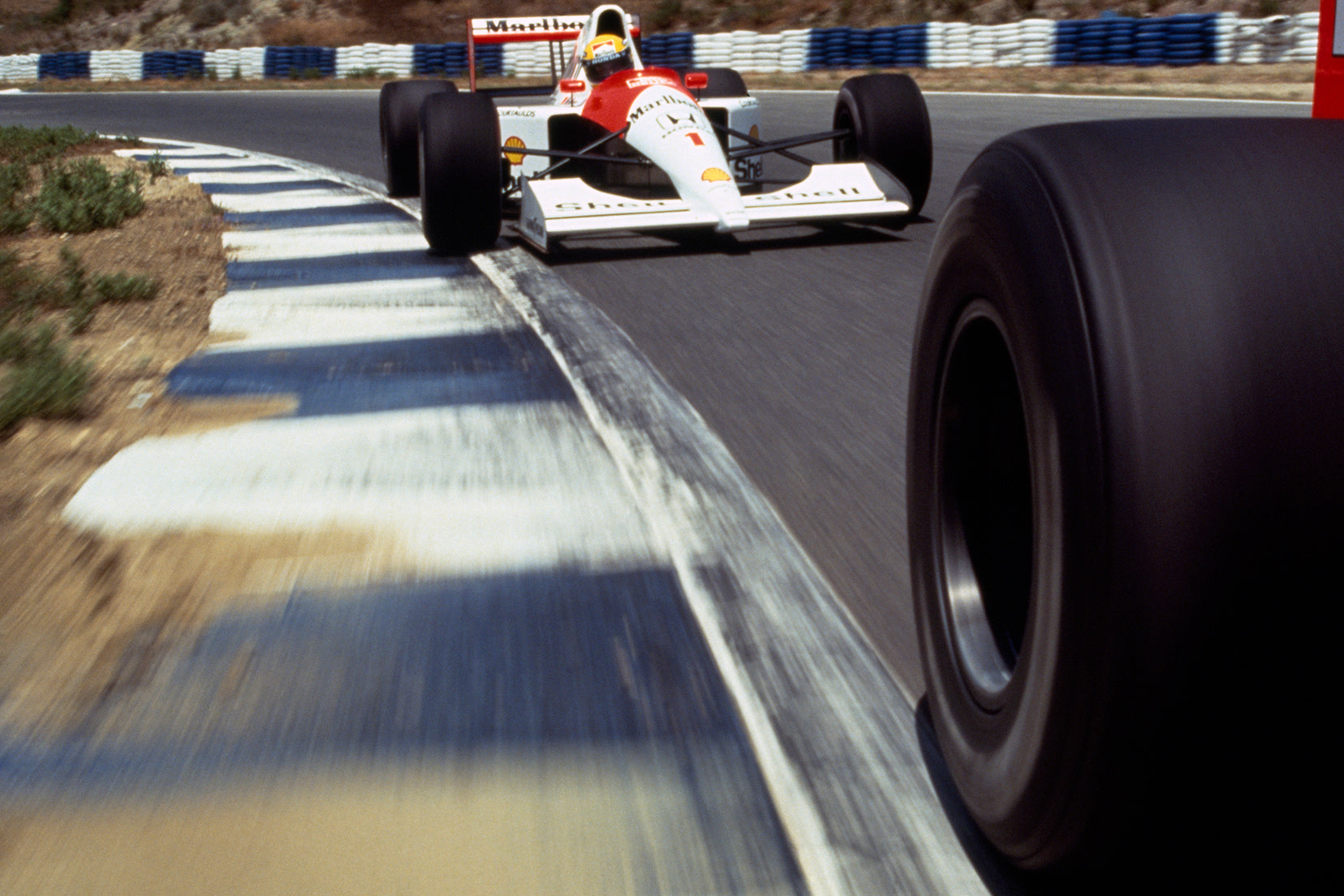
There’s one way to tell when a sports star’s success and culture status elevates him or her beyond the competition and into the company of historic legends. In boxing, that’s “Ali.” In basketball, it’s “Michael.” In golf, you need only whisper “Tiger.” In the elite world of Formula One racing, that name is “Senna.”
There’s one way to tell when a sports star’s success and culture status elevates him or her beyond the competition and into the company of historic legends. In boxing, that’s “Ali.” In basketball, it’s “Michael.” In golf, you need only whisper “Tiger.” In the elite world of Formula One racing, that name is “Senna.”
A generational talent who defined new levels of excellence in motorsports, Ayrton Senna drove a love of racing, limitless courage, and unprecedented skills to international fame and the enduring love of racing fans around the world. While his racing achievement would be more than enough to carve his name into racing monuments, his love for family and his countrymen is perhaps his greatest legacy.
Born on March 21, 1960, in São Paulo, Brazil, Ayrton Senna da Silva showed an early affinity for motorsport. He began karting at a young age, quickly demonstrating his exceptional driving skills. His family, supportive of his passion, enabled him to pursue racing in Europe, where he made his debut in 1981. His success in various junior formulas, including Formula 3, set the stage for his entry into Formula 1.
Senna signed for Toleman in 1984, making his Formula 1 debut at the Brazilian Grand Prix. After scoring several podium finishes in his rookie season, Senna moved to Lotus in 1985, marking the beginning of a remarkable string of successes. His first victory came at the Portuguese Grand Prix in 1985, where he displayed his characteristic flair and determination. Over the next few years, he would cement his status as one of the greatest drivers in F1 history.
His career achievements are truly staggering. In a 10-year career that ended much too soon, the McLaren driver won three F1 World Championships. In total, Senna won 41 races, making him the sixth-most successful driver of all time in terms of most Grand Prix wins. He also took 65 pole positions in 161 races, and his pole lap at the 1988 Monaco Grand Prix is considered one of the greatest qualifying performances in Formula 1 history.
At the time of his passing, he held the record for most pole position starts, and some 30 years since his death, Senna still claims the records for most qualifying pole positions consecutively, race to race; most qualifying front row starts consecutively, race to race; most consecutive wins annually at a Grand Prix event, having taken the flag at Monaco five seasons running from 1989 to 1993; and most consecutive pole positions annually at a Grand Prix event, qualifying first at San Marino seven seasons running from 1985 to 1991.
In 1988, Senna and McLaren partner Alain Prost won 15 of that year’s 16 Grand Prix races, with Senna claiming his first overall season championship. Still, perhaps his most impressive single achievement as a racer came in 1989 when he set a record that can only ever be matched but not beaten, for it’d be impossible to surpass Senna's percentage of front row starts in a single F1 season, since it was 100% that year.
Although he raced hard, Ayrton’s passion was matched by his compassion, as evidenced when he rushed to the scene of Martin Donnelly’s life-threatening accident in Jerez in 1990. He was also the first driver to stop when Erik Comas had a high-speed crash at Spa in 1992, switching the Frenchman’s engine off to prevent it from exploding.
Introspective, charismatic, and generous, Senna provided Brazilians—and all racing fans outside of Europe—something to believe in. Off the track and in his hometown, he gave back to the community in more ways than one, supporting local efforts that tackled one of the country’s biggest problems: education.
A gifted all-around athlete with the face of a model and the mind of a scholar, Senna could have pursued careers as a physicist or mathematician, but his love of speed and fiery competitive spirit could not be denied. No matter how long it's been, Senna’s legacy still reigns over the sport with a continued presence into the current era. In 2024—the date that marks Senna’s farewell—tributes were made around the world, including tributes from historic partners of the Senna brand and other Formula 1 teams, honoring the trajectory that forever marked motorsport.
According to Mark Gallagher, Senna is the standard by which up-and-coming talents are measured early in their careers. Gallagher held senior roles in Formula 1 and established the commercial arm of Red Bull Racing. He’s seen other champions come and go, and all of them try to match up with the immortal from Brazil.
“Senna’s legacy is all around us, from Lewis Hamilton driving Ayrton’s McLaren Honda recently in Sao Paulo to the way in which ‘the next Senna’ has entered motor racing’s lexicon,” Gallagher says. “Some 30 years after he died you can buy Ayrton Senna merchandise at a Grand Prix or witness teams and drivers sporting Senna-tribute car liveries and helmet designs.”
Jerry Perez is a veteran automotive writer and deputy editor with The Drive. His sentiments are in line with Gallagher’s, but he focuses on what Senna meant to his home nation.
“If you speak with any Brazilians, whether they’re fans of the sport or not, his legacy is perceived differently,” Perez explains. “He’s remembered as a hometown hero—a kind and giving person who tried to make a difference in a country ravaged by poverty and corruption. I believe Senna’s greater legacy is that of an emotional, sensitive, and philanthropic man who had an immense talent for driving race cars.”
A zeitgeist of the era, every racing fan around at the time is likely to have a favorite piece of Senna lore. For many, it was his emotional victory at his home Grand Prix in 1991. After years of striving for success in front of his home crowd, the win was not only a personal triumph but also a deeply emotional moment for Brazilian fans. For others, it's his collision with fellow McLaren driver Alain Prost in the 1989 Japanese Grand Prix, resulting in Senna being eliminated from the race, and sparking one of the most famous rivalries in sports history.
So much has already been said about Senna in books, television, and film documentaries, but many fans and industry insiders, like Gallagher, enjoyed their own special moments with the F1 star. “The narrow, one-way road system into the Pacific Grand Prix at the Aida circuit in 1994 meant that it was almost impossible to overtake a slower vehicle. So, when the rental car driven by my friend Keith Wiggins (owner of the Pacific Grand Prix team) was caught by a Honda, we decided there was no way they were getting by us. We sped up, but the car behind remained glued to our tail, trying to pass. Keith, who had himself raced, knew how to position the car at each corner in order to block our pursuer. Eventually we arrived at the circuit and, to our delight, we were offered the final parking place in the team and driver car park. The car behind was directed into a potholed overflow car park.”
To Gallagher’s embarrassment, it was an unhappy and raging Senna that he and Wiggins forced out of the prime parking area.
“For a few seconds we stood, looking shocked, until Ayrton’s face broke into a smile, and then a laugh. We could see it was all an act. He’d enjoyed ‘the race’. He then stood chatting with us, asking Keith how his small F1 team was going, then offered to come and talk to any potential sponsors he had going, saying, ‘If you need me to come and give a reference or just talk to someone, let me know.’ It was the last time I ever spoke to Ayrton. Two weeks later he was gone.”
It’s impossible to celebrate Senna's life and career without acknowledging his tragic loss while leading the 1994 San Marino Grand Prix in Italy. Even in death, Senna held sway over his sport. While it was determined mechanical failure was to blame, the tragedy led to sweeping reforms and a new focus on safety that continues to this day.
Reports say more than 3 million mourners attended Senna’s funeral in Brazil. There, more than anywhere else in the world, Senna is more than a racing legend, he is a national hero. His success inspired a generation of Brazilians, elevating the country's presence in motorsport. The Instituto Ayrton Senna, established in his memory, focuses on improving education for underprivileged children in Brazil, further solidifying his work as a humanitarian.
For fans of the athlete and lovers of the man, it's important to celebrate Senna’s life more than grieve his loss.
“May 1 has become Ayrton Senna Memorial Day,” Gallagher says. “His legacy can be seen in the way leading Formula 1 drivers race today – their preparedness to combine athletic fitness and raw talent with a brutal, take-no-prisoners approach to racing. He inspired all who saw him race.”

WRITTEN BY John Scott Lewinski
#HISTORY